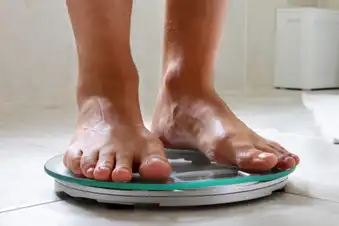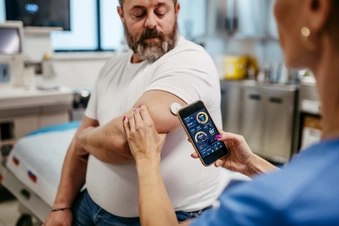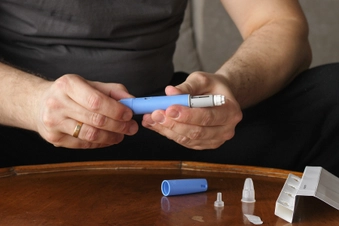Taking the Journey of Type 2 Diabetes One Step at a Time

Lifestyle Changes Make a Big Impact
Everyone experiences type 2 diabetes differently. Modifying actions that increase or decrease blood sugar will help immensely. A small amount of weight loss and minor diet changes may turn your diabetes around.
– Elizabeth S. Halprin, MD, chief, adult diabetes, Joslin Diabetes Center, Boston.

Find Your Perfect Provider Match
Take the time to find a primary care professional (PCP) who can be your partner in this lifelong health care journey – someone in your community who is close and accessible enough to see within a week or within a day for problems that can’t wait. Adults with a PCP are healthier and live longer than adults without one.
– Kevin Peterson, MD, MPH, vice president, American Diabetes Association, Minneapolis.

Use Tech to Take Part in Your Care
With the right tools, medications, support, and health care team, a type 2 diabetes diagnosis doesn’t have to be scary. Continuous glucose monitors track blood sugars in real time and allow for personalized feedback. This gives you an opportunity to make adjustments right away.
– Kara Mizokami-Stout, MD, assistant professor of internal medicine, Division of Metabolism, Endocrinology, and Diabetes, University of Michigan, Ann Arbor.

Make Medications Work for Your Needs
People with type 2 diabetes are at increased risk of blood vessel diseases. GLP1 receptor agonists and SGLT2 inhibitors lower glucose levels without low blood sugar, promote weight loss, and slow the progress of blood vessel diseases.
– Melissa Cavaghan, MD, associate professor, Division of Endocrinology and Metabolism, Indiana University School of Medicine, Indianapolis.

Get Smarter With a Diabetes Educator
Unconditional support is one of the best benefits of working with a certified diabetes care and education specialist. With all the possible ups and downs of type 2 diabetes management, it’s reassuring for my clients to know that they can get help navigating every step of their care for years to come.
– Janelle Eligon-Ketchum, registered dietitian and spokesperson, Association of Diabetes Care and Education Specialists, Philadelphia.
Show Sources
IMAGES PROVIDED BY:
- iStock/Getty Images
- E+/Getty Images
- Halfpoint/Shutterstock
- iStock/Getty Images
- DigitalVision/Getty Images
SOURCES:
Elizabeth S. Halprin, MD, chief, adult diabetes, Joslin Diabetes Center; assistant professor of medicine, Harvard Medical School, Boston.
Kevin Peterson, MD, MPH, vice president, primary care, American Diabetes Association; professor emeritus, family medicine, University of Minnesota Medical School, Minneapolis.
Kara Mizokami-Stout, MD, MSc, assistant professor, internal medicine, Division of Metabolism, Endocrinology, and Diabetes, University of Michigan Health, Ann Arbor, MI.
Melissa Cavaghan, MD, associate professor, Division of Endocrinology and Metabolism, Indiana University School of Medicine; medical director, IU Health University Hospital Medical Diagnostic Clinic, Indianapolis.
Janelle Eligon-Ketchum, RD, LDN, CDCES, spokesperson, Association of Diabetes Care and Education Specialists; founder, Nutrition Unlimited, Philadelphia.